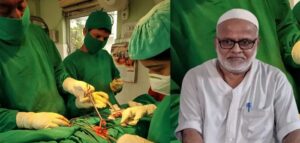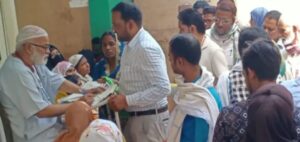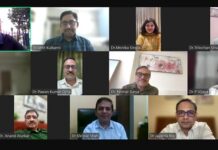

Every morning in Patna, Dr. Ejaz Ali sits on a plastic chair in the open courtyard of his hospital, greeting a long queue of patients. Despite decades of medical experience and numerous accolades, he charges only Rs. 10 for a consultation—an amount that has remained unchanged for over 30 years. In an era where medical costs soar, Dr. Ali’s commitment to affordable healthcare stands as a beacon of hope for the underprivileged. His selflessness extends beyond consultations; surgeries at his hospital are also priced significantly lower than standard rates, with many cases receiving waivers or installment plans.
Dr. Ali began practicing medicine in 1984 in Patna’s Bikhna Pahari locality. Unlike most doctors, who steadily increased their consultation fees over time, he retained his nominal Rs. 10 fee, ensuring that the underprivileged had access to quality healthcare. His hospital on Ashiana-Digha Road became a beacon of hope for thousands who could not afford expensive treatments elsewhere. Not only were surgeries at his hospital significantly cheaper—such as Rs. 17,000 for an appendix operation and Rs. 11,000 for gallbladder stone removal—but in many cases, he waived fees or allowed payment in installments.
When asked why he continues to charge so little, Dr. Ali humbly states, “I saw poverty around me, and there were certain instructions from my mother too.” His belief that doctors should prioritize their patients over profit is reflected in his day-to-day practice. His daughter, Dr. Suraiya Anjum, admires his patience, recalling, “He never raises his voice, never gets irritated. It’s not easy to imbibe these habits.” His other daughter, Dr. Naghma Anjum, shares how she has seen him operate for hours, even while fasting, with just one date to sustain him.
Humble Beginnings
Born in 1958 into a lower middle-class family, Dr. Ejaz Ali was the sixth among ten siblings. His father, Sheikh Mumtaz Ali, served as a Block Divisional Officer during the British Raj. Despite financial hardships, Ejaz Ali pursued his education with unwavering determination. He began his schooling at Madrasa Anjuman Islamia in Munger before completing his matriculation from Hazaribagh District School. Later, he joined Patna Science College and went on to earn a medical degree from Patna Medical College and Hospital in 1975, specializing in surgery.


Medicine with a Mission
Dr. Ali’s selflessness extends beyond medicine. His late wife, also a doctor, followed the same philosophy, and his children—Dr. Suraiya Anjum, a gynecologist, and Dr. Naghma Anjum, a pathologist—continue his legacy. His son, who studied medicine in the U.S., charges only Rs. 100 for consultations, staying true to his father’s values.
Champion for the Marginalized
Beyond his medical practice, Dr. Ali is a passionate advocate for social justice. In 1994, he founded the All-India Backward Muslim Morcha, fighting exclusively for Dalit Muslims and their reservation rights. His political journey saw him serving as a Member of the Rajya Sabha from Bihar, representing the Janata Dal (United) from 2008 to 2010. Later, in 2014, he joined the Rashtriya Janata Dal in the presence of Lalu Prasad Yadav, further amplifying his mission for social upliftment.
Voice in Journalism
Dr. Ali’s influence extends into journalism as well. From 1998 to 2012, he served as the Chief Editor and Publisher of Sangam, an Urdu daily published from Patna. Through his writings, he highlighted the struggles of marginalized communities, reinforcing his commitment to their cause.
A Legacy of Compassion
Dr. Ejaz Ali is more than a doctor; he is a humanitarian, a leader, and a symbol of selfless service. His tireless dedication to the marginalized continues to inspire generations, proving that true greatness lies in humility and service to others.























